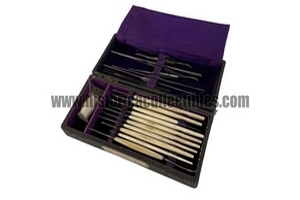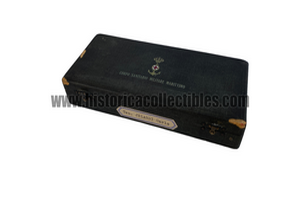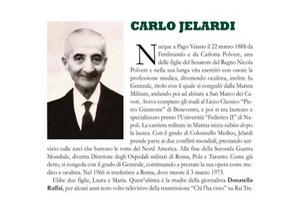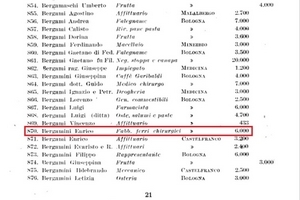Surgical cassette, Maritime Military Medical Corps - Royal Italian Navy - Carlo Jelardi - circa 1915
Ophthalmologist's surgical kit, supplied to the Maritime Military Health Corps of the Royal Navy, created by the award-winning Enrico Bergamini Surgical Instruments and Equipment Factory - Bologna.
On the front of the same, there is also a scroll which claims the use of the kit by Medical Lieutenant Carlo Jelardi who, after in-depth research, appears to have enlisted in the Maritime Military Medical Corps on 1 December 1912 after graduating from the Faculty of Medicine and Surgery, with ophthalmology specialization, at the University of Naples.
It is known that Carlo Jelardi, starting from the First World War, during his active service in the Royal Navy, carried out ophthalmic activity in the infirmaries of warships.
Furthermore, in the early 1930s he conducted important and pioneering studies (published in Germany, in Berlin in 1931) on the use of iontophoresis in ophthalmology, i.e. the administration of a drug into the body through the epidermis, transcutaneously, also called " needle-free injection".
Inside the box, which is excellently preserved, there are 20 surgical instruments.
Carlo Jelardi, was born in Pago Veiano in 1888, he was the son of the cavalier Ferdinando and the marquise Carlotta Polvere Cassitto of Ravello, as well as the older brother of Arturo Jelardi, he belonged to a noble family of San Marco dei Cavoti, but was born in the house of his maternal grandfather, the senator of the Kingdom of Marquis Nicola Polvere and, having completed his studies in Benevento, he enrolled at the University of Naples, graduating in Medicine and Surgery, then specializing in ophthalmology.
Having entered effective permanent service in the Royal Italian Navy from 1 December 1912, he was part of the Maritime Military Medical Corps, participating in the First World War where he was decorated with the Cross of Merit, and was subsequently awarded various other honors including the 1915 War Medal -1918, the gold cross for 25 years of career and the commemorative medal for the unification of Italy.
In 1930, with the rank of Major, he served at the autonomous infirmary of Castellammare di Stabia, while with the rank of Lieutenant Colonel (1931) and then Medical Colonel, he was enrolled in the roles of the Royal Navy with the specialization in ophthalmology, serving in infirmaries and on board warships.
On 31 May 1934, with a decree signed by V. Emanuele, he was awarded the honor of Knight of the Order of the Crown of Italy in Rome, and the following year that of Officer (Royal Decree, San Rossore 27 October 1935).
In 1939 he was a member of the 2nd Medical Commission of the War Pension Liquidations Committee at the Ministry of Finance, while in the years surrounding the Second World War he was director of the Maritime Military Hospital of Pola, of the Main Hospital of the Navy of Taranto and of the hospital attached to the Health Directorate of Naples (Piedigrotta).
He retired due to age limits, practicing the profession of doctor and ophthalmologist (also holding the role ad interim) in San Marco dei Cavoti, the original town of his paternal family where he lived and worked for a long time, often lending his services free of charge to needy people or to acquaintances, moved by innate modesty and religious feeling, so much so that after having saved the eye of a young man from San Marino, he told his mother who intended to pay him the fee: "Not only has the Eternal Father guided me to save your son's sight , and would you also like me to pay?"
BIBLIOGRAPHY:
- Yearbooks of the Royal Italian Navy, various years.
- Central journal for the entire ophthalmology and its border areas, Volume XXIV, Berlino 1931.
- Nino Arena, Armed Forces of the Italian Social Republic, Albertelli 1999.
- Giuseppe Moscati and the Samnite medical school of the twentieth century, Benevento 2004.




